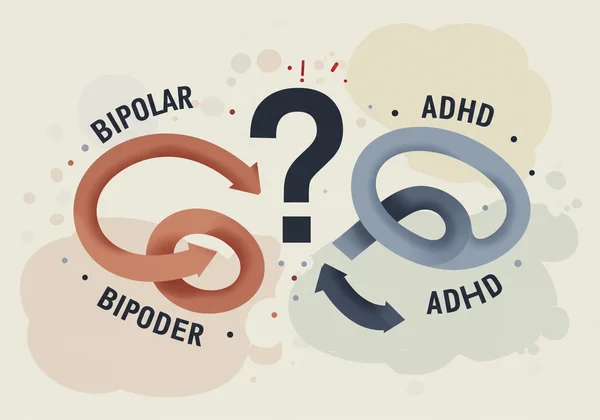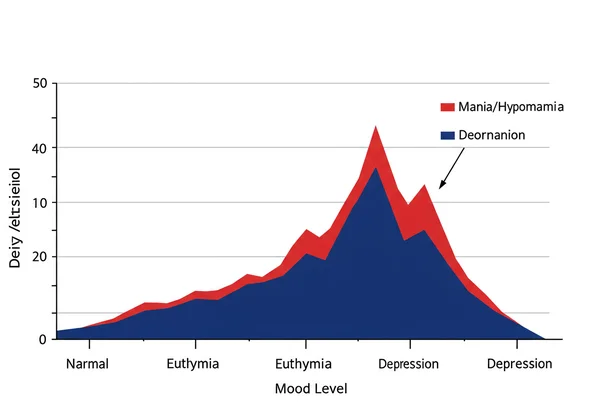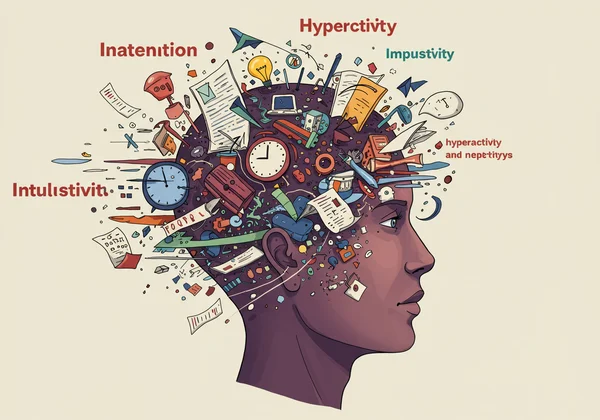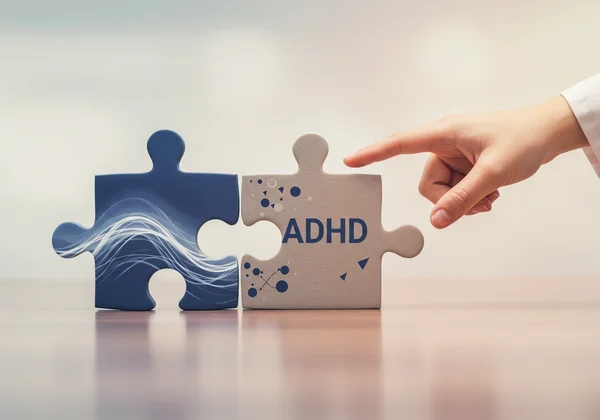Ujian Gangguan Bipolar vs ADHD: Bezakan Simptom & Dapatkan Kejelasan
September 2, 2025 | By Leo Vance
Berasa tertekan oleh perubahan mood yang mendalam, pemikiran pantas, atau ketidakupayaan berterusan untuk fokus? Anda tidak bersendirian. Ramai orang menghadapi situasi di mana pengalaman mereka kelihatan seperti ciri-ciri Gangguan Bipolar dan ADHD, menyebabkan kekeliruan yang ketara dan penangguhan yang mengecewakan dalam mendapatkan sokongan yang sewajarnya. Panduan ini bertujuan untuk menjelaskan perbezaan utama antara Gangguan Bipolar vs ADHD bagi membantu anda memahami sama ada ujian gangguan bipolar relevan dengan pengalaman anda. Apa yang lazimnya disalah anggap sebagai bipolar? Selalunya, ia adalah ADHD, dan memahami sebabnya adalah langkah pertama ke arah kejelasan.
Menavigasi kesihatan mental boleh terasa seperti cuba membaca peta dalam gelap, terutamanya apabila simptom bertindih dan menyukarkan penilaian kendiri. Walaupun artikel ini memberikan maklumat, titik permulaan yang baik untuk mengumpulkan pandangan peribadi ialah saringan berstruktur. Anda boleh mula meneroka corak emosi anda dengan ujian dalam talian sulit yang memberikan maklum balas awal berdasarkan soal selidik psikologi yang mantap.

Memahami Simptom Gangguan Bipolar
Pada terasnya, Gangguan Bipolar ialah gangguan mood yang dicirikan oleh perubahan ketara, selalunya ekstrem, dalam mood, tenaga dan tahap aktiviti. Ini bukanlah naik turun normal yang dialami semua orang; ia adalah tempoh yang berbeza, atau "episod", yang boleh mengganggu fungsi harian. Ciri utama ialah sifat kitaran keadaan mood ini, yang biasanya melibatkan kemuncak manik atau hipomanik dan penurunan kemurungan.
Ciri Utama Episod Manik, Hipomanik, dan Depresif
Untuk memahami gangguan bipolar, anda mesti terlebih dahulu memahami komponen asasnya: episod mood.
- Episod Manik: Dikenali sebagai fasa "tinggi", seseorang yang mengalami mania mungkin berasa euforia, penuh tenaga, dan mempunyai rasa kuasa yang luar biasa. Ini bukan sekadar suasana hati yang baik; ia adalah keadaan yang meningkat yang boleh membawa kepada pemikiran pantas, bercakap pantas, keperluan tidur yang berkurangan, dan tingkah laku impulsif, selalunya berisiko. Episod manik berlangsung sekurang-kurangnya satu minggu dan menyebabkan gangguan yang jelas dalam fungsi sosial atau pekerjaan.
- Episod Hipomanik: Sebagai bentuk mania yang kurang teruk, hipomania masih melibatkan perubahan ketara dalam mood dan tenaga, tetapi ia tidaklah ekstrem seperti mania yang sepenuhnya. Seseorang dalam keadaan hipomanik mungkin sangat produktif dan berasa hebat, tetapi tingkah laku mereka berbeza daripada kebiasaan mereka. Episod ini berlangsung sekurang-kurangnya empat hari berturut-turut tetapi biasanya tidak membawa kepada gangguan fungsi utama.
- Episod Depresif: Ini menandakan fasa "rendah", dengan simptom yang biasa bagi kemurungan utama. Ini termasuk kesedihan mendalam, kehilangan minat dalam aktiviti yang pernah dinikmati, perasaan tidak bernilai, keletihan, dan perubahan dalam tidur atau selera makan. Episod depresif dalam gangguan bipolar mesti berlangsung sekurang-kurangnya dua minggu.
Sifat Kitaran Perubahan Mood Bipolar
Ciri yang menentukan gangguan bipolar ialah corak episod ini dari semasa ke semasa. Seseorang akan mengalami kitaran antara keadaan ini, kadang-kadang dengan tempoh mood normal (euthymia) di antaranya. Tempoh dan kekerapan kitaran ini berbeza-beza pada setiap individu. Memahami corak episodik ini adalah penting, kerana ia sangat berbeza dengan sifat simptom ADHD yang lebih berterusan. Jika corak ini kelihatan serupa dengan pengalaman anda, mengambil ujian simptom bipolar boleh membantu menyusun pengalaman anda menjadi gambaran yang lebih jelas.

Memahami Simptom dan Impak ADHD
Gangguan Kurang Daya Tumpu/Hiperaktiviti (ADHD) ialah gangguan neurodevelopmental, yang bermakna ia bermula pada zaman kanak-kanak dan sering berterusan hingga dewasa. Tidak seperti gangguan bipolar, yang terutamanya mengenai episod mood, ADHD dicirikan oleh corak perhatian dan/atau hiperaktiviti-impulsiviti yang berterusan yang mengganggu perkembangan dan fungsi harian.
Ciri Teras: Kurang Daya Tumpu, Hiperaktiviti, dan Impulsiviti
Simptom ADHD terbahagi kepada tiga kategori utama, dan seseorang mungkin mengalami satu atau gabungan daripadanya.
- Kurang Daya Tumpu: Ini melangkaui gangguan mudah. Ia melibatkan kesukaran mengekalkan tumpuan, ketidakorganisasian kronik, kesukaran menyelesaikan tugasan, dan mudah lupa dalam aktiviti harian. Ia boleh terasa seperti fikiran anda sentiasa melayang, menyukarkan penyelesaian projek atau mendengar semasa perbualan.
- Hiperaktiviti: Ini ialah simptom klasik yang dikaitkan orang dengan ADHD. Ia nyata sebagai kegelisahan, ketidakupayaan untuk duduk diam, gelisah atau bercakap berlebihan, dan rasa sentiasa "bergerak" seolah-olah didorong oleh motor.
- Impulsiviti: Ini melibatkan tindakan tergesa-gesa tanpa pemikiran awal. Contoh termasuk membuat keputusan besar secara tiba-tiba, sering mengganggu orang lain, dan sukar menunggu giliran anda. Impulsiviti ini adalah ciri kronik berbanding sesuatu yang hanya muncul semasa episod mood tertentu.
Disregulasi Emosi dalam ADHD vs Episod Mood
Di sinilah letaknya titik kekeliruan utama. Ramai penghidap ADHD juga bergelut dengan disregulasi emosi, yang bermakna mereka mengalami reaksi emosi yang kuat yang kelihatan tidak seimbang dengan situasi tersebut. Walau bagaimanapun, perubahan mood ini biasanya bersifat jangka pendek dan dicetuskan secara langsung oleh peristiwa luaran—seperti e-mel yang mengecewakan atau berita menarik. Ia adalah ribut sekejap, bukan sistem cuaca yang berpanjangan dan terasing bagi episod mood bipolar. Menyedari perbezaan ini adalah langkah penting ke arah pemahaman yang tepat. Satu ujian gangguan bipolar dalam talian boleh membantu anda merenung sama ada perubahan mood anda bersifat situasional atau episodik.

Perbezaan Utama: Simptom Gangguan Bipolar vs ADHD
Walaupun kedua-dua keadaan boleh melibatkan impulsiviti dan ketidakstabilan mood, mekanisme dan corak asasnya adalah berbeza secara asasnya. Mari kita pecahkan perbezaan yang paling kritikal.
Tempoh dan Keamatan Perubahan Mood
Ini boleh dikatakan pembeza paling penting. Gangguan bipolar melibatkan episod mood yang berbeza yang berlangsung selama berhari-hari, berminggu-minggu, atau bahkan berbulan-bulan. Episod ini mewakili perbezaan ketara daripada keperibadian dan fungsi asas seseorang. Sebaliknya, ADHD melibatkan ketidaktetapan mood yang berlaku dari semasa ke semasa dan sering dicetuskan oleh persekitaran segera. Perubahan mood cepat muncul dan cepat pudar.
Impulsiviti: Punca Berbeza
Kedua-dua keadaan menampilkan impulsiviti, tetapi puncanya berbeza. Dalam gangguan bipolar, impulsiviti yang teruk biasanya merupakan simptom episod manik atau hipomanik, didorong oleh kebesaran diri, keyakinan diri yang meningkat, dan penghakiman yang buruk. Seseorang mungkin secara impulsif berhenti kerja atau berbelanja besar kerana, pada saat itu, ia terasa seperti idea yang cemerlang. Dalam ADHD, impulsiviti adalah ciri kronik sepanjang hayat yang berasal dari kekurangan dalam fungsi eksekutif dan kawal selia diri. Ia kurang tentang kebesaran diri dan lebih kepada kesukaran yang berterusan untuk berhenti seketika bagi mempertimbangkan akibatnya. Jika anda mempersoalkan pengalaman anda, anda boleh mengambil ujian bipolar kami untuk pandangan awal.
Apabila Gangguan Bipolar dan ADHD Berlaku Bersama
Untuk menambah lapisan kerumitan lagi, adalah mungkin bagi seseorang individu untuk mempunyai kedua-dua gangguan bipolar dan ADHD. Ini dikenali sebagai komorbiditi, dan penyelidikan menunjukkan ia bukanlah sesuatu yang jarang berlaku. Memiliki kedua-dua keadaan ini boleh menjadikan diagnosis lebih mencabar dan boleh meningkatkan simptom setiap satu.
Menavigasi Diagnosis Berganda: Cabaran dan Pertimbangan Rawatan
Diagnosis berganda memerlukan penilaian yang teliti dan komprehensif oleh profesional kesihatan mental yang berkelayakan. Rawatan selalunya perlu disusun dengan teliti, kerana sesetengah ubat perangsang yang digunakan untuk ADHD boleh berpotensi mencetuskan mania pada individu dengan gangguan bipolar yang tidak dirawat. Ini menjadikan diagnosis yang tepat amat kritikal. Seorang profesional boleh membangunkan pelan rawatan bersepadu yang menangani ketidakstabilan mood gangguan bipolar dan cabaran fungsi eksekutif ADHD.

Langkah Seterusnya Anda: Mencari Pandangan Profesional
Membezakan antara Gangguan Bipolar dan ADHD adalah langkah yang kompleks tetapi penting ke arah pemahaman yang tepat dan pengurusan yang berkesan. Walaupun panduan ini menawarkan kejelasan, ingatlah bahawa hanya profesional yang berkelayakan boleh memberikan diagnosis muktamad selepas penilaian yang teliti, yang mungkin termasuk ujian gangguan bipolar klinikal atau saringan. Perjalanan anda untuk memahami diri anda dengan lebih baik tidak perlu diambil bersendirian.
Langkah pertama selalunya yang paling sukar, tetapi ia juga yang paling memberdayakan. Melengkapi diri anda dengan maklumat dan pandangan awal boleh menjadikan perbualan dengan doktor atau ahli terapi lebih produktif. Cara yang bagus untuk mula menyusun fikiran dan pengalaman anda ialah dengan mengambil saringan percuma dan sulit. Ujian kendiri gangguan bipolar kami, yang diinspirasikan oleh alatan seperti Mood Disorder Questionnaire (MDQ), boleh memberikan anda titik permulaan yang berharga.
Soalan Lazim Mengenai Bipolar vs. ADHD
Bagaimana anda diuji untuk gangguan bipolar?
Diagnosis rasmi untuk gangguan bipolar dibuat oleh profesional penjagaan kesihatan yang berkelayakan, seperti pakar psikiatri atau ahli psikologi. Proses ini melibatkan penilaian psikiatri komprehensif yang merangkumi perbincangan terperinci tentang simptom anda, sejarah perubatan peribadi dan keluarga, serta pengalaman. Tiada ujian darah atau imbasan otak tunggal untuknya; diagnosis bergantung pada penilaian klinikal corak simptom anda dari semasa ke semasa.
Apa yang lazimnya disalah anggap sebagai simptom gangguan bipolar?
Selain ADHD, beberapa keadaan lain berkongsi simptom yang bertindih dengan gangguan bipolar. Ini termasuk gangguan personaliti sempadan (BPD), yang juga melibatkan ketidakstabilan mood dan impulsiviti; gangguan kemurungan utama (MDD), kerana individu mungkin hanya mendapatkan bantuan semasa episod depresif; dan gangguan kebimbangan tertentu. Penilaian yang teliti adalah penting untuk membezakan keadaan ini.
Adakah terdapat ujian khusus untuk gangguan bipolar?
Walaupun tiada satu prosedur perubatan tunggal yang berfungsi sebagai ujian gangguan bipolar muktamad (seperti pengambilan darah), terdapat alatan saringan dan temuduga diagnostik yang sangat berkesan. Soal selidik saringan, seperti yang terdapat di laman web kami, direka untuk membantu anda dan doktor anda mengenal pasti tanda-tanda berpotensi yang memerlukan siasatan lanjut. Anda boleh mencuba alatan percuma kami untuk mendapatkan gambaran awal tentang corak mood anda sebelum bercakap dengan profesional.
Bolehkah anda mempunyai kedua-dua gangguan bipolar dan ADHD?
Ya, ia adalah mungkin dan bukanlah sesuatu yang jarang berlaku bagi seseorang individu untuk mempunyai kedua-dua keadaan, yang dikenali sebagai komorbiditi. Diagnosis berganda memerlukan penilaian yang teliti oleh pakar kesihatan mental untuk memastikan pelan rawatan menangani simptom kedua-dua gangguan secara berkesan tanpa memburukkan salah satu daripadanya.
Penafian: Artikel ini adalah untuk tujuan maklumat sahaja dan tidak merupakan nasihat perubatan. Kandungan ini tidak bertujuan untuk menjadi pengganti nasihat perubatan profesional, diagnosis, atau rawatan. Sentiasa dapatkan nasihat doktor anda atau penyedia kesihatan berkelayakan lain mengenai sebarang soalan yang mungkin anda ada berkaitan dengan keadaan perubatan. Alatan saringan di laman web ini bukanlah ujian diagnostik tetapi sumber untuk membantu anda menilai simptom anda.